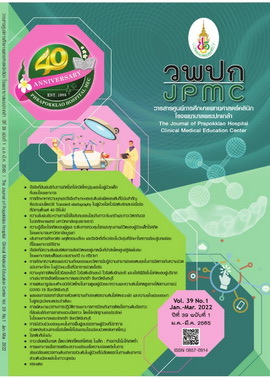Validity and Reliability of the Pain Self-efficacy Questionnaire Thai Version (PSEQ-Th) in Chronic Pain Patients with Cancer
Main Article Content
Abstract
BACKGROUND: The Pain Self-efficacy Questionnaire (PSEQ) is a self-reported questionnaire measuring self-efficacy in chronic non-malignant pain patients, and is correlated with the prognosis of pain behavior and disability. However, to the best of our knowledge, there has been no study yet with chronic malignant pain patients, so this study aimed to examine the reliability and validity of the PSEQ Thai version (PSEQ-Th) among chronic malignant pain patients in Thailand.
OBJECTIVES: To examine the validity and reliability of the PSEQ-Th in chronic malignant pain in Thai cancer patients.
METHODS: Overall, 129 patients with chronic cancer pain who visited the pain clinic at Siriraj Hospital were asked to complete 6 self-reported questionnaires: Numeric Pain Rating Score (NPRS), Depression Anxiety Stress Scale-21 (DASS-21), Roland–Morris Disability Questionnaire (RMDQ), EuroQol Group–5 Dimensions–5 levels (EQ-5D-5L), Catastrophizing Score, and the PSEQ-Th at their first visit to the clinic and then the PSEQ-Th and NPRS again at the second visit.
RESULTS: In total, 127 patients completed the PSEQ-Th questionnaires at their first visit and 113 completed them again at their second visit. The mean scores for the first and second PSEQ-Th were 38.8 (SD=14.6) and 36.2 (SD=16.5), respectively. For reliability, the Cronbach’s alpha was 0.92 and the internal class coefficient was 0.55. For validity, the PSEQ-Th was statistically significantly negatively correlated with the NPRS (r=-0.41), RMDQ (r=-0.44), DASS-21 (Stress part: r=-0.57, Anxiety part: r=-0.59, Depression part: r=-0.63), Catastrophizing score (r=-0.51), and statistically significantly positively correlated with the health status value (EQ-5D-5L: r=0.59).
CONCLUSION: The PSEQ-Th is reliable for Thai patients with chronic malignant pain. The PSEQ-Th was statistically significantly negatively correlated with the NPRS, RMDQ, DASS-21, and Catastrophizing score, and statistically significantly positively correlated with the health status value.
Thaiclinicaltrials.org number, TCTR 20211216001
Article Details

This work is licensed under a Creative Commons Attribution-NonCommercial-NoDerivatives 4.0 International License.
References
Inoue S, Kobayashi F, Nishihara M, Arai YC, Ikemoto T, Kawai T, Inoue M,et al. Chronic pain in the Japanese community-prevalence,characteristics and impact on quality of life. PLoS One [Internet]. 2015[cited 2021 Sep 14];10(6):e0129262.Available from: https://journals.plos.org/plosone/article/file?id=10.1371/journal.pone.0129262&type=printable
van den Beuken-van Everdingen MH, Hochstenbach LMJ, Joosten EAJ, Tjan-HeijnenVCG, Janssen DJ. Update on prevalence of pain in patients with cancer: systematicreview and meta-analysis. J Pain Symptom Manage 2016;51:1070-90.e9
Nicholas MK. The pain self-efficacy questionnaire: taking pain into account.Eur J Pain2007;11:153-63.
Kalapurakkel S, Carpino EA, Lebel A, Simons LE. "Pain Can't Stop Me":examining pain self-efficacy and acceptance as resilience processes among youthwith chronic headache. J PediatrPsychol2015;40:926-33.
Yazdi-Ravandi S, Taslimi Z, Jamshidian N, Saberi H, Shams J, Haghparast A.Prediction of quality of life by self-efficacy, pain intensity and pain durationin patient with pain disorders. Basic ClinNeurosci 2013 Spring;4:117-24.
Adachi T, Nakae A, Maruo T, Shi K, Shibata M, Maeda L, et al.Validation of the Japanese version of the pain self-efficacy questionnaire inJapanese patients with chronic pain. Pain Med. 2014;15:1405-17.
Van der Maas LCC, de Vet HCW, Köke A, Bosscher RJ, Peters ML. Psychometric properties of the pain self-efficacy questionnaire (PSEQ) validation, prediction, and discriminationquality of the Dutch version. Eur J Psychol Assess 2012;28:68–75.
Ferreira-Valente MA, Pais-Ribeiro JL, Jensen MP. Psychometric properties ofthe portuguese version of the pain self-efficacy questionnaire. ActaReumatolPort 2011; 36(3):260-7.
Chiarawattanavit W. Validity and reliability of the Pain Self - Efficacy questionnaire Thai version (Th - PSEQ) in chronic noncancer pain patients [disertation]. Bangkok: Mahidol University; 2018.
Coker AO, Coker OO, Sanni D. Psychometric properties of the 21 - item Depression Anxiety Stress Scale (DASS - 21). Afr Res Rev 2018;12:135-42
Lee Y, Lin PY, Hsu ST, Cing-Chi Y, Yang LC, Wen JK. Comparing the use of the Taiwanese depression questionnaire and beck depression inventory for screeningdepression in patients with chronic pain. Chang Gung Med J 2008;31:369-77.
Asghari A. Psychometric properties of a modified version of the Roland-Morrisdisability questionnaire (M-RMDQ). Arch Iran Med 2011;14:327-31.
Sonsa - ardjit N, Sakthong P. Reliability and validity of the Thai version of EQ - 5D - 5L questionnaire on patients with chronic disease. Chula Med J 2015; 59:489-501.
Youngcharoen P, Aree - Ue S, Saraboon Y. Validation of pain catastrophizingscale - Thai version in older adults with knee osteoarthritis. Pac Rim Int J Nurs Res [Internet].2018 [cited 2021 Sep 14];22:237–48. Available from: https://he02.tci - thaijo.org/index.php/PRIJNR/article/view/91289
Leaungsomnapa Y, Prasertsri N, Chaiyasung P, Suworawatanakul W, Sananpanichkul P. Pain catastrophizing: concept and application to pain research in Thailand. J PrapokklaoHospClin Med Educat Center2015;32:256–69.
Sapnas KG, Zeller RA. Minimizing sample size when using exploratory factoranalysis for measurement. J NursMeas 2002 Fall;10:135-54.
Bobak CA, Barr PJ, O'Malley AJ. Estimation of an inter-rater intra-class correlation coefficient that overcomes common assumption violations in the assessment of health measurement scales. BMC Med Res Methodol. [Internet] 2018[cited 2021 Sep 14];18:93. Available from: https://bmcmedresmethodol.biomedcentral.com/track/pdf/10.1186/s12874-020-01117-5.pdf
Paiva CE, Barroso EM, Carneseca EC, de Pádua Souza C, Dos Santos FT, MendozaLópez RV, et al. A critical analysis of test retest reliability ininstrument validation studies of cancer patients under palliative care: asystematic review. BMC Med Res Methodol.[Internet] 2014 [cited 2021 Sep 14];14:8. Available from: https://bmcmedresmethodol.biomedcentral.com/track/pdf/10.1186/1471-2288-14-8.pdf

